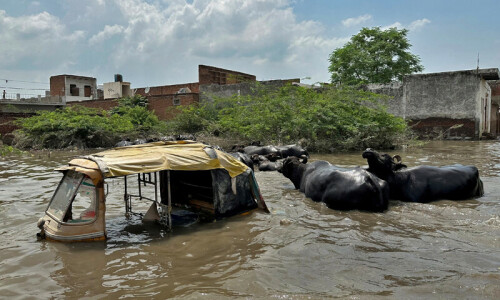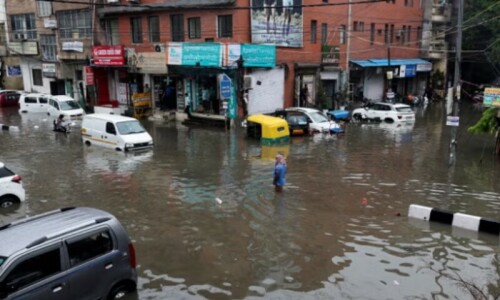Rescue workers in India battled difficult terrain and bad weather on Thursday as they searched for survivors of a landslide that killed at least 10 people in a mountain village after incessant rain soaked the slopes, officials said.
A wave of extreme heat, wildfires, torrential rain and flooding has wreaked havoc around the world in recent days, raising new fears about the pace of climate change.
The land gave way in the middle of the night in the remote hamlet of Irshalwadi, in the western state of Maharashtra, about 60 km (37 miles) from Mumbai, officials said.
Ten bodies had been recovered and more than 80 people had been rescued, but it was estimated that at least 225 people lived in the hamlet, the state’s deputy chief minister, Devendra Fadnavis, told the state assembly.
Initial reports said about 100 people were feared trapped under the debris and rescue workers were struggling in heavy rain and fog to find survivors nearly 12 hours after the disaster, a Reuters witness and media reported.
“The debris at some of the places is 10 to 29 feet deep,” S B Singh, an official with the National Disaster Response Force, told the Indian Express newspaper.
“It is difficult to bring in heavy machinery to this place. It is a 2.8 km trek to reach the spot and we have to remove the debris manually which is likely to take a lot of time.” A landslide in a nearby village killed more than 80 people two years ago.
Some pockets of the district, dotted with old forts and laced with trekking trails, received as much as 400 mm rain in the last 24 hours, according to the weather department.
More rain was expected on Thursday but not as heavy, a weather department official said, and a red alert had been issued for the coast of Maharashtra and Gujarat state to the north, which has also been battered by rain this week.
The rain has closed schools, flooded roads and disrupted transport in both Maharashtra and Gujarat.
Flash floods, landslides, and accidents caused by heavy rain have killed more than 100 people in India since the onset of the monsoon season on June 1, mostly in the north which has seen 41 per cent more rain than normal, the India Meteorological Department said.
This week, the Yamuna river reached the compound walls of the Taj Mahal for the first time in 45 years, submerging several historical monuments and gardens surrounding the 17th century, white-marble mausoleum.
In New Delhi, jammed flood gates and a broken drainage regulator let water from Yamuna flow into the city last week, inundating several areas including around the historic Red Fort, and Rajghat — a memorial dedicated to Mahatma Gandhi.














































